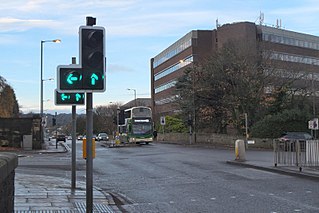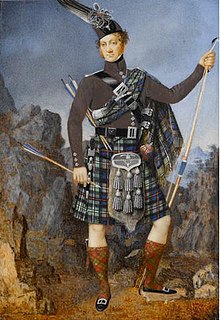Related Research Articles

William Lyon Mackenzie was a Scottish-born Canadian-American journalist and politician. He founded numerous newspapers critical of the Family Compact, a term used to identify elite members of Upper Canada. He represented York County in the Legislative Assembly of Upper Canada and aligned with Reformers. He led the rebels in the Upper Canada Rebellion; after its defeat, he rallied American support for an unsuccessful invasion of Upper Canada as part of the Patriot War. He rose in popularity after his criticism of government officials, but failed to implement most of his policy objectives. He is the most recognizable Reformer of the early 1800s.

The Straits Times is an English-language daily broadsheet newspaper based in Singapore and currently owned by Singapore Press Holdings. The Sunday Times is its Sunday edition. The newspaper was established on 15 July 1845 as The Straits Times and Singapore Journal of Commerce. The print and digital editions of The Straits Times and The Sunday Times have a daily average circulation of 364,134 and 364,849 respectively in 2017, as audited by Audit Bureau of Circulations Singapore. Myanmar and Brunei editions are published, with newsprint circulations of 5,000 and 2,500 respectively.

Sirima Ratwatte Dias Bandaranaike, commonly known as Sirimavo Bandaranaike, was a Sri Lankan stateswoman. She was the world's first female prime minister, when she became Prime Minister of Sri Lanka in 1960. She served three terms: 1960–1965, 1970–1977 and 1994–2000.

The Milwaukee Journal Sentinel is a daily morning broadsheet printed in Milwaukee, Wisconsin, where it is the primary newspaper. It is also the largest newspaper in the state of Wisconsin, where it is widely distributed. It is currently owned by the Gannett Company.

The Argus was an Australian daily morning newspaper in Melbourne from 1846 to 1957. It was considered to be the general Australian newspaper of record for this period. Widely known as a conservative newspaper for most of its history, it adopted a left-leaning approach from 1949. The Argus's main competitor was David Syme's more liberal-minded newspaper, The Age.

The Portland Press Herald/Maine Sunday Telegram is a morning daily newspaper with a website that serves southern Maine and is focused on the greater metropolitan area around Portland, Maine, in the United States.

Johnston Press plc was a multimedia company founded in Falkirk, Scotland, in 1767. Its flagship titles included UK-national newspaper the i, The Scotsman, the Yorkshire Post, the Falkirk Herald, and Belfast's The News Letter. The company was operating around 200 newspapers and associated websites around the United Kingdom and the Isle of Man when it went into administration in 2018. The Falkirk Herald was the company's first acquisition in 1846. Johnston Press's assets were transferred to JPIMedia in 2018, who continued to publish its titles.

The Melbourne Advertiser was the first newspaper published in Melbourne, in what was then known as Port Phillip District, and now is Victoria, Australia. It was published by John Pascoe Fawkner, a co-founder of Melbourne. The first edition appeared on 1 January 1838 handwritten in ink by Fawkner himself and displayed at his hotel.
The mass media in Singapore refers to mass communication methods through broadcasting, publishing, and the Internet available in the city-state. Singapore's media environment is considered to be highly controlled by the government. Comprising the publishing, print, broadcasting, film, music, digital, and IT media sectors, the media industry collectively employed about 38,000 people and contributed 1.56% to Singapore's gross domestic product (GDP) in 2001 with an annual turnover of S$10 billion. The industry grew at an average rate of 7.7% annually from 1990 to 2000, and the government seeks to increase its GDP contribution to 3% by 2012.

James Alexander Stewart-Mackenzie, was a Scottish politician and British colonial administrator.
The Falkirk Herald is a weekly newspaper and daily news website published by JPIMedia. It provides reportage, opinion and analysis of news, current affairs and sport in the towns of Falkirk, Grangemouth, Larbert and Denny as well as the neighbouring villages of Polmont, Redding, Brightons, Banknock and Bonnybridge. The paper's circulation area has a total population of 151,600, the fifth largest urban area in Scotland. The Falkirk Herald had an audited circulation of 21,937 in the six months from July-December 2012, making it the biggest selling local weekly newspaper in Scotland. It was named Weekly Newspaper of the Year at the 2013 Scottish Press Awards.

The Register, originally the South Australian Gazette and Colonial Register, and later South Australian Register, was South Australia's first newspaper. It was first published in London in June 1836, moved to Adelaide in 1837, and folded into The Advertiser almost a century later in February 1931.

The Californian was the first California newspaper.
The Times of Ceylon was an English language daily newspaper in Sri Lanka published by Times of Ceylon Limited (TOCL). It was founded in 1846 as the Ceylon Times and was published from Colombo. It ceased publication in 1985.
Sunday Observer is a weekly English-language newspaper in Sri Lanka, published on Sundays. The Sunday Observer and its sister newspapers the Daily News, Dinamina, Silumina and Thinakaran are published by Associated Newspapers of Ceylon Limited, a government-owned corporation. The paper, which was established in the present-day format in 1928, has roots that date back to 1834 when Sri Lanka was under the British rule. It is the oldest Sri Lankan newspaper in circulation apart from the Government Gazette. The current Editor is Dharisha Bastians.
The Colombo Journal was a short-lived English-language bi-weekly newspaper in Ceylon. The newspaper started on 1 January 1832 with George Lee as editor. George Lee was the Superintendent of the Government Press and later Postmaster General. The newspaper had the support of the government and Governor Robert Wilmot-Horton. Apart from Horton and Lee other senior government officials who wrote for the newspaper included the governor's private secretary Henry Tufnell and George Turnour. Criticism of the British government led to the newspaper being closed by the Colonial Office on 31 December 1833.
The Ceylon Chronicle was a short-lived English-language newspaper in Ceylon. The newspaper started on 3 May 1837 with Rev. Samuel Owen Glenie as editor. Rev. Glenie was the Anglican Colonial Chaplain of St. Paul's Church and later Archdeacon of Colombo. Although owned privately by a group of civil servants, the newspaper took a pro-government stance and had the support of senior government officials. Governor Robert Wilmot-Horton, Treasurer Temple, Postmaster General George Lee, Acting Chief Justice Sergeant Rough, Auditor General Henry Marshall and Proctor Henry Staples all wrote for the newspaper. The Ceylon Chronicle was a counter-weight to The Observer and Commercial Advertiser which opposed the government.

The Ceylon Observer was an English language daily newspaper in Sri Lanka published by Associated Newspapers of Ceylon Limited (ANCL). It was founded in 1834 as The Observer and Commercial Advertiser and was published from Colombo. It ceased publication in 1982.
George Lee was the first Superintendent of the Government Printing Office in Ceylon, between 1833 and 1835 and the Postmaster General of Ceylon between 1844 and 1859.
The Types Riot refers to the destruction of William Lyon Mackenzie's printing press and movable type by members of the Family Compact on June 8, 1826, in York, Upper Canada. Mackenzie's editorials in the Colonial Advocate newspaper, which questioned the Family Compact's ability to govern Upper Canada and described negative personal stories about them and their families, offended the rioters. It is not known who planned the riot, although Samuel Jarvis later claimed he organized the event. During the riot, Mackenzie's employees tried to get passersby to help stop the rioters, but bystanders refused after they saw government officials like William Allan and Stephen Heward were watching the spectacle and assumed the Upper Canadian government had sanctioned the event.
References
- 1 2 3 4 "Significant events in May: An English newspaper". The Sunday Times (Sri Lanka) . 30 April 2006.
- 1 2 Martyn, John H. (1923). Notes on Jaffna - Chronological, Historical, Biographical (PDF). Tellippalai: American Ceylon Mission Press. p. 206. ISBN 81-206-1670-7.
- 1 2 3 4 5 6 7 8 9 10 "Periodicals and Newspapers in Ceylon" (PDF). Journal of the Dutch Burgher Union of Ceylon. XXXI (4): 149–150. April 1942. Archived from the original (PDF) on 2015-09-23.